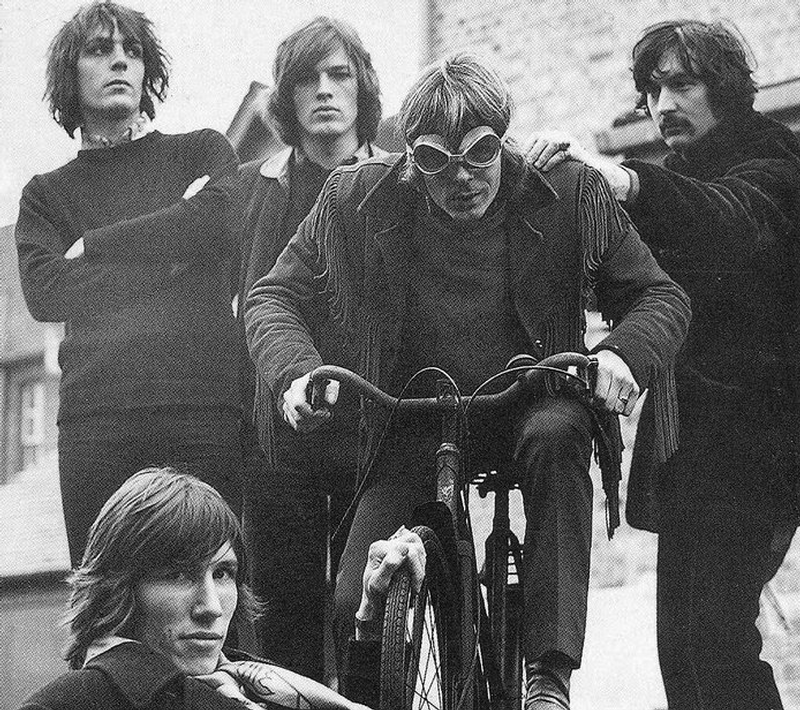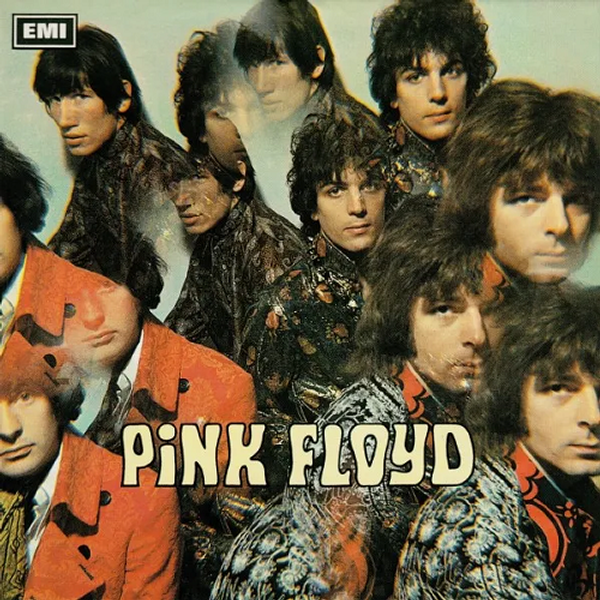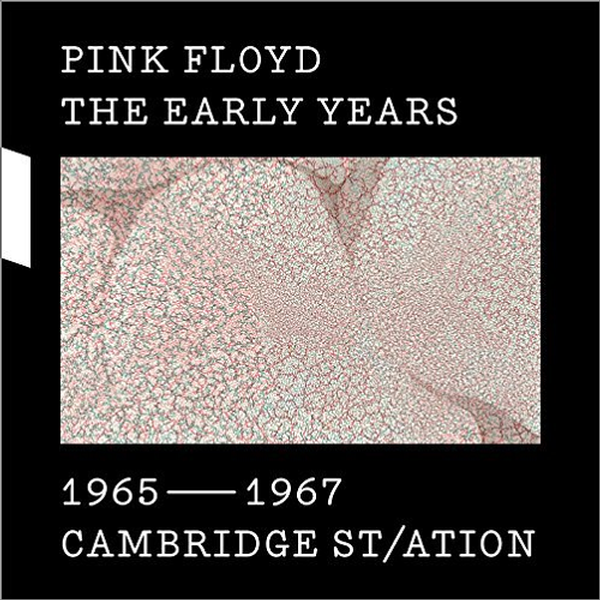






From: London, England

Pink Floyd is considered by many to have been the most innovative progressive rock band of the 1970s, but many still don't realize the tremendous impact that they had on the psychedelic scene of the 60s. In their early days, one of the band's founders and leader, Syd Barrett (guitar, lead vocals), blew people’s minds with his creative melodies, aggressive string work and out of the box showmanship. Even after Barrett's premature departure, the rest of the group retained his vision by sculpting themselves into true masters of sound, light and vision.
The group was founded in late 1965 by students Barrett, along with Roger Waters (bass, vocals), Richard Wright (keyboards, vocals) and Nick Mason (drums). The band was originally called the Tea Set, but then renamed by Barrett as the Pink Floyd Sound after Piedmont Blues greats Pink Anderson and Floyd Council, of whom he was both huge fans of. By early 1966, the group's repertoire consisted mainly of R&B riffs surrounded by sonic effects from Barrett and Wright. They then began to receive paid bookings, including a first time performance at the Marquee Club in the spring of that year. They were initially discovered by London School of Economics lecturer Peter Jenner and his friend and business partner Andrew King, who loved the band’s sound so much that they founded the management company Blackhill Enterprises and bought them £1,000 worth of new instruments and equipment. Jenner also suggested they drop the "Sound" part of their moniker and under his and King's guidance, Pink Floyd quickly became an integral part of London's underground music scene, regularly performing at venues including All Saints Hall and the Marquee. The group also experimented with long instrumental excursions, which they augmented with rudimentary but effective light shows, projected by colored slides and lights. Jenner and King's social connections also helped by giving the group prominent coverage in the Financial Times and an article in the Sunday Times, which stated: "At the launching of the new magazine IT the other night, a pop group called the Pink Floyd played throbbing music while a series of bizarre colored shapes flashed on a huge screen behind them... apparently very psychedelic."
In 1966, the band strengthened their business relationship with Blackhill Enterprises, becoming equal partners with Jenner and King, with each of the band members holding a one-sixth share. By late 1966, their set included fewer R&B standards and more Barrett originals, many of which would end up on their first album. While they had significantly increased the frequency of their performances, the band was still not widely accepted in the mainstream. Following a performance at a Catholic youth club, the owner refused to pay them, claiming that their performance was not music. When their management filed suit in small claims court against the owner of the youth organization, a local magistrate upheld the owner's decision. The band was much better received at the UFO Club in London, where they began to build a loyal fan base with Barrett's creative improvisation, including rolling a large ball bearing down the guitar strings, leading the charge.
In 1967, Pink Floyd began to attract the attention of the music industry, signing with EMI and releasing their first single (the innovative 'Arnold Layne' b/w the even more creative 'Candy And A Currant Bun') in the spring of that year on their Columbia label. "Layne's" references to cross-dressing led to a ban by several radio stations; however, creative manipulation by the retailers who supplied sales figures to the music business meant that the single peaked in the U.K. at #20. Also around this time, they headlined The 14 Hour Technicolor Dream event held at the Alexandra Palace. A second 45 (the outstanding 'See Emily Play' b/w 'Scarecrow') was issued in the summer of '67, which sold better than the first, reaching the #6 spot on the U.K. charts. They appeared on the BBC's Top of the Pops and were riding a wave of popularity, but Barrett had begun using LSD heavily on a regular basis, causing him to slowly unravel both socially and emotionally. After the success of their first two records, EMI lined them up to record a debut LP (creatively titled Piper At The Gates Of Dawn) at Abbey Road Studios, which includes a lot of their then stage material in contrast to their singles, which they didn’t perform live. Tracks like 'Astronomy Domine’, 'Lucifer Sam' and 'Bike' sharply contrast both stylistically and in tempo, but still somehow jell together in a cohesive and monumental piece of work. The album peaked at #6, spending 14 weeks on the U.K. charts and a month later was released on the Tower label in the U.S. A third and final Barrett penned non-LP single ('Apples And Oranges' b/w Wright's excellent 'Paint Box') was issued in November of '67, with Barrett becoming more and more outrageous (yet still creative) with his music. A few other notable Barrett tunes ('Scream Thy Last Scream' and 'Vegetable Man') featured here on TWOS were recorded around the same time, but deemed too outlandish for an official release.
Pink Floyd continued to draw large crowds at the UFO Club; however, Barrett's mental deterioration was now causing serious concern. He had his guitar around his neck and his arms just hanging down". It has been said by other members of the band that he had went off for a weekend with a crowd that was known for heavy drug use, and when he came back he was never the same. The group initially hoped that his erratic behavior would be a passing phase, but some were less optimistic, including Jenner and his assistant, June Child, who commented: "I found him in the dressing room and he was so... gone. Roger Waters and I got him on his feet, and got him out to the stage... The band started to play and Syd just stood there." Forced to cancel the band's appearance at the prestigious National Jazz and Blues Festival, as well as several other shows, King informed the music press that Barrett was suffering from nervous exhaustion. Waters arranged a meeting with a psychiatrist and personally drove Barrett to the appointment; however, he refused to get out of the car. The band followed a few concert dates in Europe during September, 1967 with their first tour of the U.S. in October. As the American tour went on, Barrett's condition grew steadily worse. During television appearances on Dick Clark's American Bandstand and The Pat Boone Show into November, Barrett confounded his hosts by not responding to questions and staring off into space. He also refused to move his lips when it came time to lip sync 'See Emily Play' on Boone's show. After these embarrassing episodes, King ended their U.S. visit and immediately sent them home to London. Soon after their return, they supported the Jimi Hendrix Experience during a tour of England; however, Barrett's depression worsened as the tour continued, reaching a crisis point in December, when the band responded by adding a second guitarist and vocalist to their lineup, David Gilmour.
The photo here on TWOS snaps the brief period when the Floyd was a quintet. For a handful of shows, Gilmour played and sang while Barrett wandered around on stage, occasionally attempting to join in. The following classic story sums it up: According to Waters, Barrett came into what was to be their last practice session with a new song he had titled 'Have You Got It, Yet?'. The song seemed simple enough when he first presented it to his bandmates, but it soon became impossibly difficult to learn. As they were practicing it, Barrett kept changing the arrangement and would then play it again, with the arbitrary changes, and sing "Have you got it yet?" After more than an hour of trying to "get it", they realized they never would and that they were simply bearing the brunt of Barrett's rather obtuse sense of humor. The other band members soon tired of Barrett's antics, and in January 1968, on the way to a show at Southampton University, simply elected not to pick him up. They attempted to retain him in the group as a songwriter, much as the Beach Boys had with Brian Wilson, but this proved unattainable. Jenner and King believed Barrett to be the creative genius of Pink Floyd, and decided to end their relationship with the band upon his departure. The Floyd's booking agent Bryan Morrison then sold his business to NEMS Enterprises, and Steve O'Rourke became the band's personal manager.
In 1968, Pink Floyd returned to Abbey Road Studios to record a second LP (A Saucerful Of Secrets). Waters began to nurture his own songwriting with 'Set The Controls For The Heart Of The Sun', 'Let There Be More Light' and the raucously delicious 'Corporal Clegg', while Wright composed 'See-Saw' and 'Remember A Day'. The album, issued in June, 1968, also includes Barrett's final contribution to their discography, the solemn 'Jugband Blues'. The record peaked at #9, spending 11 weeks on the U.K. charts with John Peel describing a live performance of the title track as "like a religious experience". On the day after the album's release, Floyd performed at the first ever free Hyde Park concert and then in July, returned to the U.S. for a second tour accompanied by the Who and Soft Machine. In December of that year, they released the incredibly underrated 'Point Me At The Sky', which would be the band's last single until their 1973 release of 'Money'.
1969 saw a transitional period for Pink Floyd, focusing more on ethereal melodies and experimental sound effects. In the summer of that year, they provided the music for the European film More, which tells the tale of a German man's hitchhiking adventure from Lübeck to Paris to see the world without money. Highlights include the dreamy 'Cymbaline' and the contrasting, guitar-heavy rockers 'Ibiza Bar' and 'The Nile Song'. Later that year, the band issued the double LP Ummagumma, with one record housing recent live U.K. performances, and the other featuring experimental studio work from each individual band member. Highlights include Waters' sublime 'Grantchester Meadows' and Gilmour's 'The Narrow Way', which is a fledgling representation of the musical style that the quartet would later master in the 1970s. It should also be noted that around this time, the group appeared on stage with Frank Zappa at a music festival in Belgium for a rather extensive and weird jam session.
At the dawn of 1970, the band continued to tour the U.K. and Europe, and then contributed to the soundtrack for the U.S. film Zabriskie Point, which was a commercial failure despite other musical heavyweights like the Grateful Dead, Youngbloods and Kaleidoscope also providing experimental material. The spring of that year saw the band tour America for the first time since 1968, hitting both coasts as well as a multitude of inland cities including Chicago, Detroit, Salt Lake City, Atlanta and New Orleans. In October, the Floyd released their fifth studio album titled Atom Hear Mother, which features the title track taking up the entire A-side at over 23 minutes long. Highlights on the record include Write's 'Summer '68' and Gilmore's 'Fat Old Sun'. The LP became their first to hit #1 in the U.K. and eventually went gold in the U.S. The cover was designed by the Hipgnosis art collective, featuring a simple dairy cow on the front with the album title and group's name nowhere to be found.
1971 saw the band tour Japan and Australia for the first time in August of that year, followed by the release of the LP Meddle in the fall. This album is excellent and considered by many to be their first great 70s work. Another movie soundtrack followed in 1972, this time supporting the French film La Vallée, but the group retitled the LP Obscured By Clouds after having a falling out with the film company. By this time, the band had already began work on their monumental conceptual work The Dark Side Of The Moon, which was issued in the spring of 1973. This LP launched the band into super stardom, topping the charts in the U.S., Canada and Austria, and remaining a worldwide top seller for decades, eventually selling over 45 million copies into the late 1980s. Other successful progressive concept albums followed in 1975 (Wish You Were Here), 1977 (Animals) and 1979 (The Wall). By the end of the 70s however, the band had virtually destroyed themselves from the inside out with creative conflict and infighting. A final "full lineup" LP (The Final Cut) was issued in 1983, which includes mostly outtakes from The Wall and is essentially a Waters solo album.
In 1986, the band reunited without Waters to record the outstanding LP A Momentary Lapse Of Reason, which was eventually released in the fall of 1987. A highly successful world tour followed, which TWOS was able to attend at Wembley Stadium in London, in the midst of over 100,000 people and no reserved seating! A second Waters free LP (The Division Bell) was issued in the spring of 1994 and a final (The Endless River) in late 2014, which was created as a tribute to Rick Wright who had passed away from cancer in 2008. Barrett had also since past in 2006. The three surviving members of the band remain heavily active in music to this day, with Waters and Gilmore continuing to independently tour the world in front of very large audiences. Mason spends a lot of his time now as an avid motor car racer and helicopter pilot, and recently toured as Nick Mason's Saucerful Of Secrets in 2019, playing mostly 60s Floyd and all pre-The Dark Side Of The Moon... TWOS attended their Milwaukee show and was quite impressed!

Songs from this album played on TWOS:
(Original 45 Label: Columbia DB 8214, B - June, 1967)

Songs from this album played on TWOS:
(Original 45 Label: Columbia DB 8310, A - November, 1967)
(Original 45 Label: Columbia DB 8156, A - March, 1967)
(Original 45 Label: Columbia DB 8156, B - March, 1967)
(Original 45 Label: Columbia DB 8310, B - November, 1967)
(Originally Unreleased - 1967)
(Original 45 Label: Columbia DB 8214, A - June, 1967)
(Originally Unreleased - 1967)